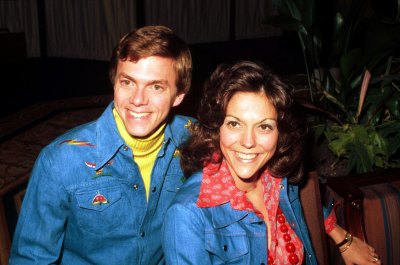
Ken McKay/ITV/Shutterstock; South Coast Press/Shutterstock
Richard Carpenter Reveals Sister Karen’s Anorexia Struggle Had Her Lying ‘Down Between Shows’
At the 25th annual Grammy Awards, Richard and Karen Carpenter joined other past winners for a group portrait. In it, the brother-sister duo, who sold more than 30 million records, smile alongside Dionne Warwick, Glen Campbell, Gladys Knight and other music luminaries.
Sadly, a mere 24 days after the photo was taken, Karen would be dead from heart failure caused by years of eating issues. Today, her brother, Richard, 74, keeps a copy of that photo on a table in his living room in Los Angeles.
“Karen was silenced way too soon,” he tells Closer. “She’d be 71 now, and I’m certain she’d be absolutely fabulous. We would have had hundreds of recordings we’d already done, and we’d still be making more. That’s what I miss.”
While it’s impossible not to mourn the tragic loss of Karen at age 32, a new book, Carpenters: The Musical Legacy, by Mike Cidoni Lennox and Chris May with Richard Carpenter, seeks to put the focus back on the music.
Richard allowed the authors access to previously unpublished private photos, tour itineraries and other memorabilia from the heady days when the Carpenters were “on top of the world.”

Along the way, Richard also hopes to set the record straight on some of the myths and rumors surrounding Karen’s illness, his own struggle with addiction and the pressure and stress that fame put on their lives. “We really were an overnight sensation,” he says. “And then it was one hit after another. And albums as well. We were headlining Vegas a little over a year from when we hit. Everything happened very fast.”
Karen was just 19 and Richard was 23 when they signed with A&M Records in 1969. Their first album didn’t go anywhere, but their second included the single “(They Long to Be) Close to You.” The song had been previously recorded by Dionne Warwick, Dusty Springfield and actor Richard Chamberlain — but Richard’s fresh arrangement and Karen’s warm caramel voice took it to No. 1.
“It’s still my proudest achievement,” Richard says. Very quickly, the Carpenters became a marquee act, and the pressure on the two siblings from the L.A. suburbs mounted. “If you look at those schedules, especially all those one-nighters, we didn’t need to be doing them,” says Richard, who notes that the Carpenters did not have a manager to protect them.
The pair hated the album cover art for Close to You, but were bullied into accepting it. “It was a crazy time,” Richard says. “They showed up with this heart album cover. We said, ‘We hate it.’ They said, ‘Learn to love it.’ We never learned to love it.”
As their stars rose higher, the pressures increased. Karen’s dieting, which she began in earnest in 1967, became a bigger obsession. Yet no matter how thin or weak she looked, she always rose to the occasion.

“Whenever Karen was struggling with anything, she threw herself into her work,” explains author Chris May. “Richard said she liked to work more than he did.”
But by 1975, she weighed just 91 pounds. “It had gotten so bad that she had to lie down between shows,” Richard recalls. “Nonetheless, she continued to sing as beautifully as ever.”
Richard, meanwhile, became addicted to Quaaludes, which he’d begun taking to help him sleep. As his tolerance grew, he began skipping meals. At one point, the 6-foot-tall musician weighed a skeletal 140 pounds. “I just lost my will to do much of anything,” says Richard, who calls their 1978 album, Christmas Portrait, “not a true Carpenters Christmas record” because he did very few of the arrangements.
In 1979, he entered rehab and successfully kicked his addiction. Over the years, Karen sought therapy for her anorexia. Richard believes the medical establishment failed her, and it’s something he still gets upset about.
A famed psychotherapist treated her in 1982, but did “nothing to help her,” Richard says. After her weight continued to sink, she was hospitalized at New York’s Lenox Hill Hospital, where a feeding tube meant to nourish her accidentally punctured one of Karen’s lungs.
She was released in time for Thanksgiving but died three months later. While he can never forget the heartbreaking circumstances of his sister’s death, Richard would prefer if fans focus instead on the Carpenters’ musical legacy. “You know, we were a pair of kids from the suburbs,” he says. “I believed in Karen as a singer, myself as an arranger, and the two of us as a sound.”






































